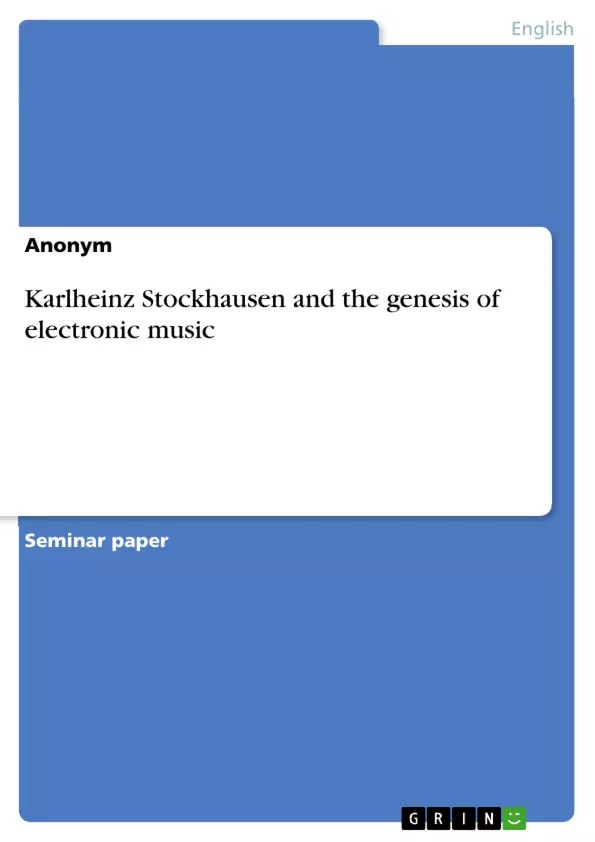Electronic music is everywhere. In the digital age it has never been easier for everyone among us to not only listen to compositions fashioned entirely with the help of modern
technology, without a single tone being produced by a classic instrument, but to become part of the creative process as well. Basic sound recording and editing software is available for free online and each individual with access to a somewhat up to date personal computer and a stable internet connection could, theoretically, become an artist and composer in their own right. Dance, techno, trance and house music is featured regularly in the charts all over the world and has become a well accepted part of cultural life.
This paper intends to look back on the origins of electronics in music, from the first experiments with recording mediums and the creative act of editing discs and tapes to the composition of the first pieces devoted exclusively to artificially generated sounds. The development from the early days of the French musique concrète to the German based elektronische Musik is traced by following the influence of the inspired genius Karlheinz Stockhausen from a small studio in Paris back to Cologne where he produced the formative works of this new branch of music, his Elektronische Studien I + II. The importance of Stockhausen’s achievements are then underlined by briefly comparing the progress pouring forth from the new unity of music and electronics in Europe and the United States and, more importantly, by exploring his legacy and the inspiration Karlheinz Stockhausen offered and still continues to provide to whole generations of new and popular musicians and composers.
Inhaltsverzeichnis (Table of Contents)
- Introduction
- Historical context and creative background
- Electronic Music | Elektronische Musik
- Origins and characteristics
- Elektronische Studien | + ||
- Stockhausen's inspiration, influence and legacy
- Conclusion
Zielsetzung und Themenschwerpunkte (Objectives and Key Themes)
This paper explores the origins of electronic music, tracing its development from early experiments with recording mediums to the emergence of compositions solely based on artificially generated sounds. It focuses on the influence of Karlheinz Stockhausen, a pioneering figure in the field of electronic music, and examines his contribution to the creation of a new branch of music known as Elektronische Musik. The paper also discusses Stockhausen's legacy and his ongoing influence on contemporary musicians and composers.
- The origins and development of electronic music
- The impact of technological advancements on musical composition
- The role of Karlheinz Stockhausen in the genesis of electronic music
- The influence of electronic music on contemporary musical practices
- The lasting legacy of Karlheinz Stockhausen in the field of music
Zusammenfassung der Kapitel (Chapter Summaries)
- Introduction: The introduction provides an overview of the paper's scope, highlighting the widespread presence of electronic music in today's digital age and the accessibility of music creation tools. It sets the stage for exploring the historical development of electronic music, focusing on the contributions of Karlheinz Stockhausen.
- Historical context and creative background: This chapter examines the evolution of avant-garde music in the 20th century, emphasizing the role of technological innovation and the use of electricity in music production. It traces the development of early electronic instruments and their influence on musical performance and composition. The chapter also explores the early experiments with recording mediums, particularly the use of gramophone discs and photographic film strips, and their impact on the creation of new forms of music.
- Electronic Music | Elektronische Musik: This chapter delves into the origins and characteristics of electronic music, highlighting the emergence of musique concrète in France and the development of Elektronische Musik in Germany. It focuses on the influence of Karlheinz Stockhausen and his groundbreaking work on the Elektronische Studien I + II.
Schlüsselwörter (Keywords)
The main keywords and focus topics of this work include electronic music, Karlheinz Stockhausen, Elektronische Musik, musique concrète, recording technology, avant-garde music, technological innovation, and musical composition. The paper explores the impact of these concepts on the development of a new genre of music and its lasting legacy in contemporary musical practices.
Frequently Asked Questions
Who was Karlheinz Stockhausen and why is he important for electronic music?
Stockhausen was a pioneering German composer whose "Elektronische Studien I + II" are considered formative works in the creation of artificially generated music.
What is the difference between "musique concrète" and "elektronische Musik"?
Musique concrète (French) focused on recording and editing natural sounds, while the German elektronische Musik aimed at sounds generated entirely by electronic means.
How did technology influence the development of electronic music?
Innovations like magnetic tape, gramophone disc editing, and photographic film strips allowed composers to manipulate sound in ways classical instruments could not.
What are Stockhausen's "Elektronische Studien I + II"?
These are groundbreaking compositions produced in a Cologne studio that relied exclusively on electronic sound generation, defining a new branch of music.
What is Stockhausen's legacy in modern popular music?
His work provided inspiration for generations of musicians in genres like dance, techno, trance, and house music, which are now global cultural staples.
How accessible is electronic music creation in the digital age?
Today, free recording and editing software allows anyone with an internet connection and a computer to become a composer, a process that started with Stockhausen's experiments.
- Arbeit zitieren
- Anonym (Autor:in), 2014, Karlheinz Stockhausen and the genesis of electronic music, München, GRIN Verlag, https://www.grin.com/document/295033



